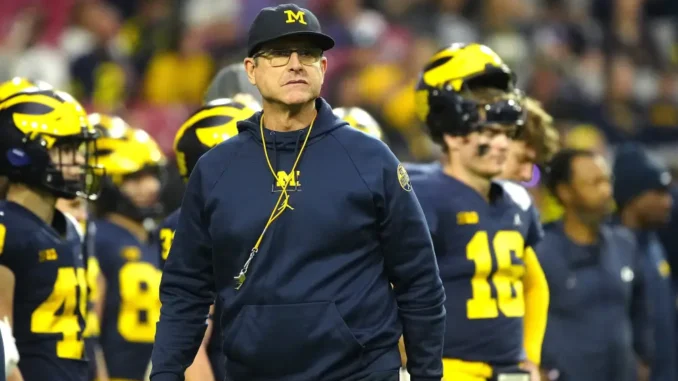
Michigan arrived in southern California on Tuesday evening, bathed in the fading sunlight and exuding unwavering confidence. With an impeccable 13-0 record, a third consecutive Big Ten championship, and the top seed in the College Football Playoff, the Wolverines stand as the undisputed rulers of the north.
However, this season’s on-field triumphs are accompanied by a tumultuous off-field saga over the past 12 months. This tumult includes the abrupt firing of two assistant coaches, two NCAA investigations into potential rules violations, allegations of a sign-stealing operation worthy of a future documentary, and an underlying conflict between Michigan leadership and the Big Ten.
Despite the chaos, head coach Jim Harbaugh, who served a six-game suspension earlier in the season, is leading Michigan into a Rose Bowl showdown against Alabama on January 1. This marks the team’s third consecutive appearance in the College Football Playoff semifinals.

To gauge the Wolverines’ perspective on their journey, one can turn to defensive back Mike Sainristil’s response to a question about feeling like underdogs against Alabama. Sainristil dismisses concerns about their schedule and coaching changes, emphasizing the team’s primary focus on proving their worth.
The essence of this Michigan team becomes evident upon closer inspection. It comprises passionate and dedicated players who embrace the Michigan way. The team carries a collective chip on its shoulder, fueled by various motivations. Harbaugh and his coaching staff quietly built a physical, dominant run game in response to Ohio State’s previous dominance with a pass-heavy offense.
Michigan’s success culminated in back-to-back Big Ten titles and CFP appearances. Despite setbacks, a core group, including players like Blake Corum and defensive coordinator Jesse Minter, opted to return for another season, driven by past failures and a desire for redemption.
The drama unfolded after Michigan’s CFP loss to TCU, with the program under NCAA investigation for alleged recruiting violations. Offensive coordinator Matt Weiss faced legal scrutiny for accessing school-related accounts inappropriately, leading to his swift termination.

Amid these challenges, the team remained focused on its goals. An unexpected revelation in mid-October regarding a staff member’s role in signal-stealing added to the turmoil. While opinions vary on the impact, it prompted extensive news coverage, NCAA scrutiny, and Harbaugh’s suspension for three additional games.
Michigan tight end Colston Loveland highlights the team’s resilient mindset, emphasizing the importance of focusing on what they can control amidst distractions. During Harbaugh’s suspension, offensive coordinator Sherrone Moore stepped up as acting head coach, guiding the team to victory in critical games.
The Wolverines completed a 12-0 regular season, boasting the nation’s top defense, a efficient quarterback, a healthy running back duo, and an expanded passing attack. Moore’s impressive coaching performance positions him as a potential successor to Harbaugh should the latter leave for the NFL.
Michigan insists it has learned from the past two CFP appearances, approaching the Rose Bowl with a determined mindset. The Crimson Tide present a formidable challenge, blending the physicality of Georgia with an explosive offense. Michigan aims to limit quarterback Jalen Milroe and establish a dominant run game.
Despite the distractions, including NCAA investigations, a suspended head coach, and coaching changes, Michigan embraces an “us-against-the-world” mentality. The players view every obstacle as an opportunity to prove their resilience and determination, epitomized by running back Blake Corum’s declaration that the 2023 season is “natty or bust.”
Leave a Reply